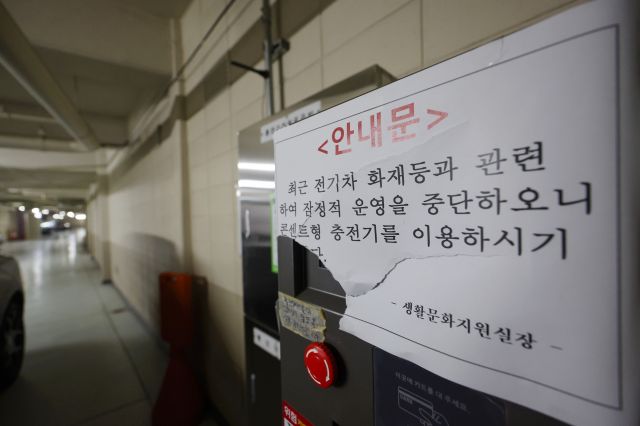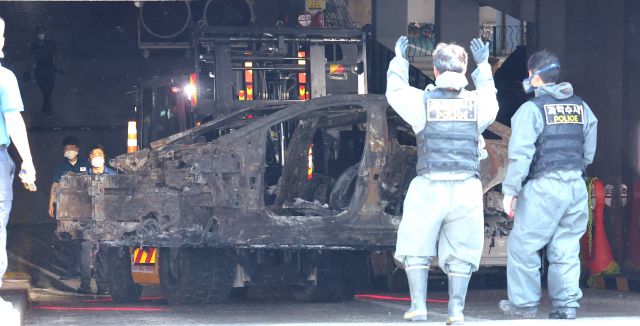Battery fire Buddha, response meetings vary
Lack of control tower in ‘partitioned administration’
Criticized for “deskbound administration” with charging rate restrictions,

A notice of the suspension of operation is attached to a fixed electric vehicle charger installed in the underground parking lot of an apartment in downtown Seoul on the 12th. Yonhap News,
,
, ‘The Incheon Cheongna underground parking lot electric vehicle fire incident that occurred on the 1st is spreading as ‘electric vehicle phobia’, but the government is being criticized for its inconsistent response without a clear control tower, fueling citizens’ anxiety with individual responses from electric vehicle-related ministries continuing in a ‘partitioned administration’.’,
,
, ‘On the 12th, the Ministry of Environment held a ‘electric vehicle fire response’ meeting with related ministries such as the Ministry of Industry, Trade and Resources, the Ministry of Land, Infrastructure and Transport, the Ministry of Public Administration and Safety, and the Fire Department. The Ministry of Industry and Trade previously called for a separate response meeting with representatives of the automotive industry on the 8th. The Ministry of Land, Infrastructure and Transport was scheduled to hold a separate meeting on the 13th on topics such as the public disclosure of electric vehicle battery manufacturers, but a meeting organized by the Presidential Office for related ministries at the vice-minister level was hastily scheduled for the same day, making future schedules uncertain. A government official said, “The meeting on the 13th is a place for related ministries to discuss short-term and long-term measures together.”‘,
,
, ‘The underground parking lot electric vehicle fire incident is not the first this time. The number of electric vehicle fires has been increasing every year from 24 cases in 2021 to 43 cases in 2022, and 72 cases last year. The government established a joint civic-military task force following the ‘Hwaseong lithium battery factory fire’ in June to “check major disaster risk factors on a large scale.”‘,
,
, ‘Nevertheless, the government continues to waver in its response to successive battery fire incidents. Even ministries responsible for a single battery item differ. The Chinese battery company involved in this incident, Paracise, manufactures battery cells. Safety standards for battery cells are managed by the Ministry of Industry and Trade. The Mercedes-Benz electric vehicle that caught fire is under the jurisdiction of the Ministry of Land, Infrastructure and Transport. The Ministry of Environment hosted the fire response meeting that day, but its responsibilities include electric vehicle subsidies and charging station installation projects. Large-scale social disasters such as underground parking lot fires fall under the jurisdiction of the Ministry of the Interior and Safety. Kwun Yong-joo, a professor of automotive transportation design at Kookmin University, said, “Ministries that were promoting electric vehicle adoption are now fighting for leadership in regulation.”‘,
,
,

Police moving an electric vehicle that caught fire at an underground parking lot in Cheongna-dong, Seo-gu, Incheon on the afternoon of the 5th after completing a joint inspection at the scene of the fire. Yonhap News,
, ‘Measures related to electric vehicle fires are also being repeatedly reproduced. The government said, “We will prepare a comprehensive plan for electric vehicle fire prevention and announce it early next month.” However, the Fire Department and the Ministry of Land, Infrastructure and Transport have already created their own ‘electric vehicle fire response manuals’ and ‘apartment electric vehicle fire response manuals’ and even distributed them externally. These include guidelines for apartment management offices and regulations on sprinkler operation.’,
,
, ‘Individual measures are poured out in the absence of a control tower. The Ministry of Oceans and Fisheries announced on the 8th that it will establish recommended standards to limit the charging rate of electric vehicles during ship transportation to within 50% in the latter half of the year. Seoul City also announced on the 9th that only electric vehicles with a charging rate below 90% will be allowed to park in underground parking lots. Among electric vehicle drivers, there is criticism that “focus on charging rate regulations rather than accident prevention measures is avoidance through deskbound administration.” Professor Kwun said, “The most important thing for preventing electric vehicle fires is developing safety technology.” \n’

